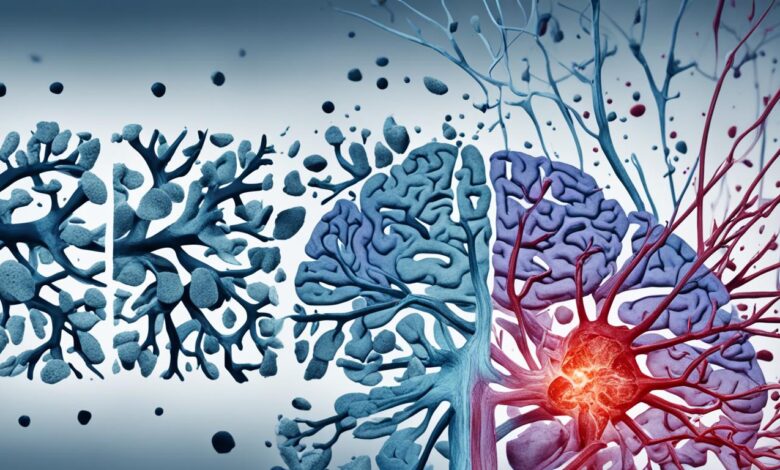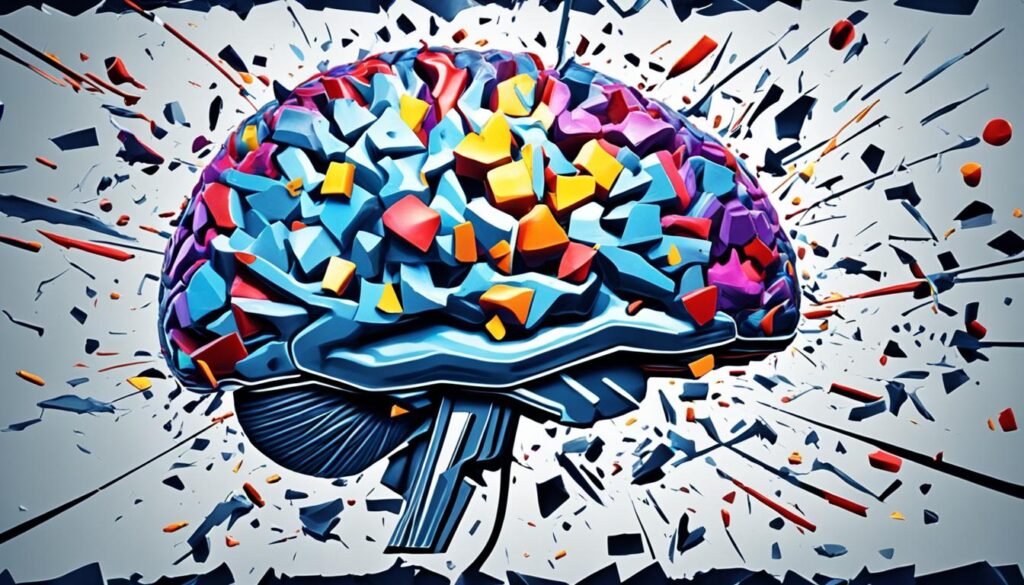Understand the Impact of Traumatic Brain Injury

Have you thought about the impact of traumatic brain injury? What happens when the brain gets a powerful blow? How does this affect our day-to-day life and well-being? Let’s dive into the world of TBI and find answers together.
Traumatic brain injury (TBI) happens when a sudden force hits the head or body. It can cause temporary or lasting brain function issues. TBI might come from accidents, sports, or falls. It can be with or without a broken skull.
The signs of TBI can be different for everyone. You might have headaches, see blurry, or feel sick. Or you could be confused, see changes in your mood, and face complex brain issues. Kids can also show signs like not wanting to eat, losing interest in play, or being unsteady.
Join our journey to learn about the impact of traumatic brain injury and recovery paths.
Types of Traumatic Brain Injury
Traumatic brain injury (TBI) falls into two main types: penetrating and non-penetrating injuries. Penetrating TBI happens when something breaks the skull and enters the brain, causing damage in one area. Non-penetrating TBI, or closed head injury, happens from a force that moves the brain inside the skull.
Non-penetrating TBI, also known as closed head injury or blunt TBI, can come from falls, car accidents, sports, or getting hit by objects. This injury is caused by a hit to the head that makes the brain shake inside the skull. A person can have both penetrating and non-penetrating TBI from the same accident.
Knowing about different TBIs helps doctors diagnose and treat them better. By understanding the injury type, medical teams can give each patient the right care. Let’s look more into these two TBI types and what they mean.
Signs and Symptoms of Traumatic Brain Injury
It is vital to know the signs and symptoms of traumatic brain injury (TBI). Quick recognition leads to early treatment. Symptoms vary based on the injury’s severity. By spotting and understanding these signs, people and their families can get the right help. This helps everyone move forward in recovery.
Physical Symptoms
Physical symptoms of TBI can include:
- Headaches
- Convulsions or seizures
- Blurred vision
- Draining of fluid from the nose or ears
- Neurological deficits
The intensity and length of these symptoms differ. When they appear, it’s important to see a doctor.
Cognitive/Behavioral Symptoms
People with TBI often face cognitive and behavioral changes. These may consist of:
- Loss of consciousness
- Confusion or disorientation
- Memory problems
- Changes in sleep patterns
- Mood swings
These changes deeply impact day-to-day life and well-being.
Sensory Symptoms
Sensory issues are also common with TBI. They may include:
- Dizziness or vertigo
- Hearing problems
- Sensitivity to light or sound
Such sensory symptoms can be hard to handle. Special care and adjustments might be needed to manage them.
TBI in Children
Symptoms of TBI in children can look different from adults. Kids might show:
- Changes in eating habits
- Irritability
- Loss of balance
These signs indicate a possible TBI in kids and need serious attention.
Promptly noticing the signs of TBI means faster medical help and better recovery chances. It is crucial for the well-being of those with TBI.
Effects of Traumatic Brain Injury on the Brain
Traumatic brain injury (TBI) causes immediate and long-term issues for the brain. This includes bleeding, swelling, and metabolic changes. Such changes can harm the brain, affecting how it works and communicates.
Diffuse axonal injury (DAI) happens from rotational forces or sudden stops. It damages brain cell communication. DAI leads to various symptoms, impacting a person’s life significantly.
Concussions, mild forms of TBI, happen from hits to the head. They cause short-term cognitive problems. Even as the less severe type, concussions still lead to noticeable cognitive challenges.
TBI can also create blood clots, bruising, and chronic traumatic encephalopathy (CTE). These issues further affect how the brain functions, causing long-term damage.
The later effects of TBI, like cognitive decline and mood changes, might not show up right away. They can emerge later, impacting behavior and thinking. Knowing how TBI affects the brain helps in treating and supporting those affected.

Brain Damage and Implications
Brain damage from TBI affects many aspects of life. It can change how one thinks, moves, and feels. The damage can lead to trouble with memory, attention, and communication.
Those with TBI might find moving hard, affecting daily and recreational activities. Proper rehab and support are vital for recovery. They help people regain independence and function.
Also, TBI often causes emotional and behavioral changes. People might feel mood swings, get irritable, or feel depressed. Handling these emotional effects is key for effective treatment and better life quality.
How Traumatic Brain Injury Affects Brain Function
Traumatic brain injury (TBI) can seriously impact how the brain works. It leads to problems with thinking, moving, and feeling. The kind of trouble a person faces depends on how bad the injury is and where it happened in the brain.
Cognitive Problems
Cognitive issues are a frequent result of TBI. Affected individuals may find it hard to pay attention, remember things, or make decisions. They may not focus well, forget new information, or struggle with choices.
Physical Problems
Physical issues may also arise from TBI. These can involve struggles with coordination, muscle strength, staying balanced, and getting tired easily. Often, physical therapy is needed to help improve movement and strength after a brain injury.
Emotional/Behavioral Problems
TBI can change how a person feels and acts. They might go through mood changes, get easily upset, or have a hard time with their feelings. These emotional ups and downs can make it tough to handle relationships and feel good about life.
When TBI affects different brain areas, it can lead to specific problems. Getting the right help and support is important. It can make a big difference in dealing with these challenges and living a better life.
Common Problems Associated with TBI
| Problem | Description |
|---|---|
| Cognitive Problems | Difficulties with attention, concentration, memory, and decision-making |
| Physical Problems | Coordination issues, weakness, balance problems, and reduced endurance |
| Emotional/Behavioral Problems | Mood swings, irritability, difficulty controlling emotions, and changes in social interactions |
Long-Term Effects of Traumatic Brain Injury
Traumatic brain injury (TBI) can have effects that last a long time. These long-term effects can change how someone thinks, feels, and acts. They can affect senses, how one communicates, and how they control their emotions. Knowing these effects helps give proper support and better life quality to TBI survivors.
Research has found a link between TBI and brain diseases like Alzheimer’s disease, Parkinson’s disease, and chronic traumatic encephalopathy. Though we’re still figuring out why, it seems having more than one TBI might raise the risk of these illnesses.
TBI survivors might face many long-term effects. They can struggle with remembering things, paying attention, and solving problems. They might find it hard to understand what they see or hear or to talk with others. Feeling moody or quick to anger can happen too.
It’s vital for everyone involved – caregivers, doctors, and those with TBI, to know about these effects. Understanding and tackling these issues can lead to better help and recovery. This way, those dealing with TBI’s aftermath can have improved lives.
Immediate and Longer-Term Complications of Traumatic Brain Injury
Traumatic brain injury (TBI) impacts health and well-being immediately and over time. Severe TBI often leads to serious complications.
After a TBI, seizures might happen, showing a sudden brain activity change. Nerve damage could cause problems with feeling and movement. Blood clots are also a risk, raising the chance of stroke by blocking blood flow. The brain might get infected if its defenses are breached.
“Seizures, nerve damage, blood clots, stroke, and infections are immediate complications of traumatic brain injury” – Dr. Alex Lee, Neurologist
Later on, TBI survivors may struggle with thinking clearly and remembering things. They might notice changes in how they see or hear. Speaking and understanding others can become difficult. Many also experience mood changes and find it hard to get along with people.
Each TBI is unique, so the effects vary by the injury’s severity and location. Treating and managing these issues requires personalized care.
Immediate and Longer-Term Complications of Traumatic Brain Injury
| Immediate Complications | Longer-Term Effects |
|---|---|
| Seizures | Cognitive difficulties |
| Nerve damage | Sensory changes |
| Blood clots | Communication problems |
| Stroke | Emotional and behavioral disturbances |
| Infections |
Structure and Function of the Brain
The brain is key in our daily lives. It helps us process info, control our body, and shapes our thoughts and feelings. Understanding it is vital.
The brain has two parts: the left and right hemispheres. They work differently. The left side controls the right part of the body and deals with language and logic. The right side handles the left part of the body, creativity, emotions, and how we understand space.
Moreover, the brain has several lobes, each with its own task. These include the frontal, parietal, temporal, and occipital lobes.
| Lobe | Function |
|---|---|
| Frontal Lobe | It’s all about making decisions, planning, solving problems, and managing emotions. |
| Parietal Lobe | This lobe processes sensory info and helps with understanding space, touch, and temperature. |
| Temporal Lobe | It focuses on hearing, understanding language, and memory. |
| Occipital Lobe | Its main job is to deal with vision and interpreting what we see. |
This complexity lets us think critically, solve problems, use language, remember things, and regulate emotions. Our brain’s parts connect and work together for all these tasks.
“The human brain is the most complex structure in the known universe.” – Michio Kaku
Physical Problems Associated with Traumatic Brain Injury
People with traumatic brain injury (TBI) often face physical challenges. These include coordination issues, weakness, and trouble with balance. How severe these problems are can depend on how bad the injury is. Even if they learn to walk or use their hands months after the injury, challenges can persist.
One common issue is coordination problems. This makes it hard to do tasks that need precise movements. It can be tough to button a shirt, tie shoelaces, or use eating utensils because of this.
Another issue is weakness, which can impact different muscles in the body. This leads to less strength and limited movement. Simple tasks like lifting items, going up stairs, or standing for a long time become hard.
Balance issues are also frequent in people with TBI. Brain damage can mess up the systems that control balance. This results in instability and a higher chance of falling. Keeping balance while walking or doing activities that need coordination can be very hard.
For those with TBI, doing physical activities they used to enjoy, like sports, can be tougher. They may also feel tired quickly. This means they need to take breaks and not overdo it. But with the right rehab and support, many can live independently and continue working.
Cognitive and Emotional/Behavioral Problems Following Traumatic Brain Injury
Traumatic brain injury (TBI) affects individuals significantly. These effects impact everyday activities and require rehab and support for management.
Cognitive Difficulties
Attention can be tough with TBI. People may find it hard to stay focused. Memory issues are also common, leading to difficulty in remembering information.
Problems in communicating and expressing thoughts appear too. This makes choosing the right words hard. Decision-making becomes slow because of problems with thinking and solving issues.
Emotional Changes
Emotional changes after TBI include mood swings. Individuals might go through quick emotional shifts. They also might feel irritable, getting frustrated or angry easily.
There’s often a lack of motivation. Starting and continuing activities can be hard. Social interactions can suffer from not understanding social signs well.
Behavioral Changes
Behaviorally, TBI leads to impulsive actions and less self-control. Personality changes might result, altering traits and behaviors. Engaging in enjoyed activities might decrease as individuals face TBI challenges.
Support and advice are necessary to help adapt to changed roles and duties.
Addressing the problems TBI brings is vital. Rehabilitation, speech therapy, and counseling help manage these issues effectively.
Recognizing and tackling these challenges helps TBI individuals regain independence and improve life quality.

| Cognitive Difficulties | Emotional Changes | Behavioral Changes |
|---|---|---|
| Attention difficulties | Mood swings | Impulsive behaviors |
| Memory problems | Irritability | Changes in personality |
| Communication problems | Lack of motivation | Decreased participation in activities |
| Slowed thinking | Difficulties in social interactions | Adapting to changed roles |
| Problem-solving difficulties |
Conclusion
Traumatic brain injury (TBI) deeply affects people’s lives. It changes how they think, feel, and move. Understanding TBI types, signs, and brain effects is key. This knowledge helps with correct diagnosis, treatment, and support.
Recovery from TBI is tough and long. It needs lots of rehab and support. Raising awareness and giving good care can help people on their recovery journey.
Special therapies and treatment plans are important. They help TBI survivors live better lives. Support from doctors, families, and communities is crucial too.
Even though TBI has big effects, recovery is possible. Easy access to resources and teamwork can help TBI patients improve. They can learn to live with their new challenges.
Continuing research and education about TBI is important. It helps us find better ways to help those hurt by TBI.






